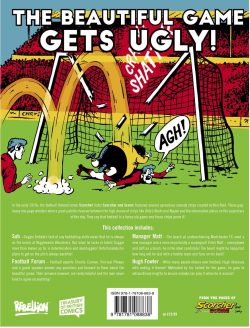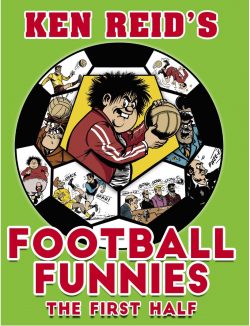

By Ken Reid (Rebellion Studios)
ISBN: 978-1-78108-883-8 (HB/Digital edition)
If you know British Comics, you’ll know Ken Reid.
He was one of a select and singular pantheon of rebellious, artistic prodigies who – largely unsung and regularly uncredited – went about transforming British Comics, entertaining millions and inspiring hundreds of those readers to become cartoonists too.
Reid was born in Manchester in 1919 and apparently drew from the moment he could hold an implement. Aged nine, he was confined to bed for six months with a tubercular hip, and occupied himself by constantly scribbling and sketching. He left school before his fourteenth birthday and won a scholarship to Salford Art School, but never graduated.
He was, by all accounts, expelled for cutting classes and hanging about in cafes. Undaunted, he set up as a commercial artist, but floundered until his dad began acting as his agent.
Ken’s big break was a blagger’s triumph. Accompanied by his unbelievably supportive and astute father, Ken talked his way into an interview with the Art Editor of the Manchester Evening News and came away with a commission for a strip for its new Children’s Section.
The Adventures of Fudge the Elf debuted in 1938 and ran until 1963, with only a single, albeit lengthy, hiatus from 1941 to 1946 when Reid served in the armed forces.
From the late 1940s onwards, Reid dallied with comics periodicals. Super Sam, Billy Boffin, Foxy were published in Comic Cuts and he sent submissions to prestigious market leader The Eagle, before a fortuitous family connection – Dandy illustrator Bill Holroyd was Reid’s brother-in-law – brought DC Thomson managing editor R.D. Low to his door with a cast-iron offer of work.
On April 18th 1953 Roger the Dodger debuted in The Beano with Reid drawing the feature until 1959. He created numerous others, including the fabulously mordant doomed mariner Jonah, Ali Ha-Ha and the 40 Thieves, Grandpa and Jinx amongst many more.
In 1964, Reid and fellow under-appreciated superstar Leo Baxendale jumped ship to work for DCT’s arch rival Odhams Press. This gave Ken greater license to explore his ghoulish side: concentrating on comic horror yarns and grotesque situations in strips like Frankie Stein, and The Nervs in Wham! and Smash!, as well as more visually wholesome but still strikingly surreal fare as Queen of the Seas and Dare-a-Day Davy.
In 1971 Reid devised Face Ache – arguably his career masterpiece – for new title Jet. The hilariously horrific strip was popular enough to survive the comic’s demise – after a paltry 22 weeks – and was carried over in a merger with stalwart periodical Buster where it thrived until 1987. Ken Reid died that year from the complications of a stroke he’d suffered on February 2nd . He was at his drawing board, putting the finishing touches to a Face Ache strip. On his passing, the strip was taken over by Frank Diarmid who drew it until cancelation in October 1988.
All his working life, Reid innovated; constantly devising new strips like Harry Hammertoe the Soccer Spook, Wanted Posters, Martha’s Monster Makeup, Tom’s Horror World, Creepy Creations and World-Wide Weirdies. He was also always open to fresh opportunities. This collection gathers a quartet of series he created for specialist comics weeklies Scorcher and Scorcher and Score: both specialist boys’ periodicals blending strips, photo-features and general sports journalism dedicated to the beautiful game.
Preceding them is text feature ‘Kicking it Off…’ by Reid’s son Antony J., describing the circumstances that saw a man in his 50s with no appreciable interest in or knowledge of football accept an offer from a desperate editor and pull off a hat trick (plus one!) of unique series by displaying the seldom seen side of the great scribbler: his inspirational and ironclad professionalism and admirable “have-a-go” attitude…
Scorcher kicked off on January 10th 1970, became Scorcher and Score after 77 issues (by merging with Score ‘n’ Roar in early July 1971) and called “time” with the October 5th 1974 issue – a further 171 outings. Its best bits were ultimately absorbed into Tiger, but Annuals and Summer Specials continued to appear until 1984.
As suits the nature of the magazines, each Reid picture riot (originally running from January 1970 to mid-1972) is individually hilarious but in total a bit formulaic. That was never a problem at the time as editors held the belief that readers had a definite shelf-life and would quickly move on to better things… like Chaucer, Len Deighton, or the back pages of The Sun or Daily Mirror…
Moreover, Reid was meant to be a half-time palate cleanser. Straight football comics content was already covered by traditional – if often unconventional – strips like Kangaroo Kid, Royal’s Rangers, Bobby of the Blues, Paxton’s Powerhouse, Lags Eleven, Jack of United, Jimmy of City, and later classics Hotshot Hamish, Nipper, and Billy’s Boots.
The line-up for Scorcher #1 included Reid’s Sub (He’s always on the sidelines!), with unfit, unloved and decidedly fiendish Duggie Dribble on the touchline. He was always there: as well as being hated by Biggleswick Wanderers’ manager and other players, Dribble was useless on the field. His disappointment turned to malice and he spent his days trying to take out his own teammates just so he could get a game…
Before being replaced in the August 15th edition, Duggie conspired to maim, poison, hypnotise, overfeed, electrocute his colleagues, and regularly employed other tactics, like sabotaging kit, relocating matches, wrecking pitches and even occasionally offering to play for the opposition in his fervour for a kickabout in front of roaring crowds – who didn’t much like him either.
Each episode is a single page masterclass in black comedy, macabre timing and grotesque excess that would do the Addams Family proud…
Substituting for Dribble’s doomed tactics, Football Forum (August 15th 1970-January 16th 1971) took a satirical and often absurdly surreal swipe at TV pundits as a panel of experts answered questions posed by readers – for the usual £1 postal order despatched to the lucky cove who fired Reid’s imagination that week. The panel included referee Percival Peeps, Centre-Forward Charlie Cannon and a guest speaker carefully tailored to deliver maximum laughs. Subjects covered included ‘The best way to take a penalty’; ‘is soccer too dirty?’; ‘players’ hair length’; ‘are players overpaid?’, ‘are referees too soft?’ and ‘how to deal with teams who play the offside trap’ but the answers were never helpful and frequently led to mayhem, carnage and use of the damp sponge…
Arguably, Reid’s most well-regarded contribution was Manager Matt, who began his career in the January 23rd edition. Pompous and self-important Matt was fed up with the standard of positions he was offered at the Labour Exchange and was fortunate enough to be passing by Mudchester United’s ground just as the corrupt and doddering Board of Directors agreed that what they needed was a complete fool to take the blame for their mismanagement and malfeasance. Soon the perfect scapegoat was in situ: a man who knew nothing about anything…
To be fair, it was the perfect set-up, because the stadium was a shambolic neglected ruin and the players were little better than beasts and bullies. Over the next 29 weeks, team and neophyte tyrant slowly gelled into a bunch of useless strangers who hated each other but somehow managed to win a few matches and even go on a world tour that enabled them to bring home a sack full of European silverware…
Manic and compulsive, these tales are less about football than the fundamentals of slapstick comedy, but they are astoundingly entertaining.
Concluding this first foray into football fun comes a strip you can’t help but feel is Reid being utterly honest with himself and the readers.
Hugh Fowler – The man who HATES football! launched in the August 14th issue (and ran until May 6th 1972), with a man very much the prototype of Basil Fawlty fulminating and thundering over his loathing for the Beautiful Game.
Each week he attempted to spoil matches, maim players and even excise the sport from the ken of mankind. Obviously he ultimately failed in his endeavours as people still gather to sing songs, eat pies and cheer on fit people as they chase a ball, but that’s probably due more to the interference of pesky kids spoiling his schemes than his facility with explosives, superglue, kidnapping, pitch sabotage, match fixing, ball tampering and so forth.
He even tried to remove the sport from libraries and stop the printing of Scorcher and Score, but somehow his divine crusade never achieved its aims…
There’s a bit of extra time left in this initial foray, and an Annuals sections calls up a couple of Sub shorts from the Scorcher Annual 1970 whilst the 1971 seasonal package finds Manager Matt languishing in laundry woes and the 1973 edition sees Hugh Fowler extend his campaign to include arcade games with equally unpleasant outcomes…
This astoundingly absorbing comedy classic is another perfect example of resolutely British humorous sensibilities – absurdist, anarchic and gleefully grotesque – and these lesser known cartoon capers are a welcome reintroduction to the canon of British comics history: painfully funny, beautifully rendered and ridiculously unforgettable. This is one more treasure-trove of laughs to span generations which demands to be in every family bookcase. Part of Rebellion’s ever-expanding Treasury of British Comics, this is a superb tribute to the man and a brilliant reminder of what we all love…
© 1970, 1971, 1972, & 2021 Rebellion Publishing Ltd. All Rights Reserved.
